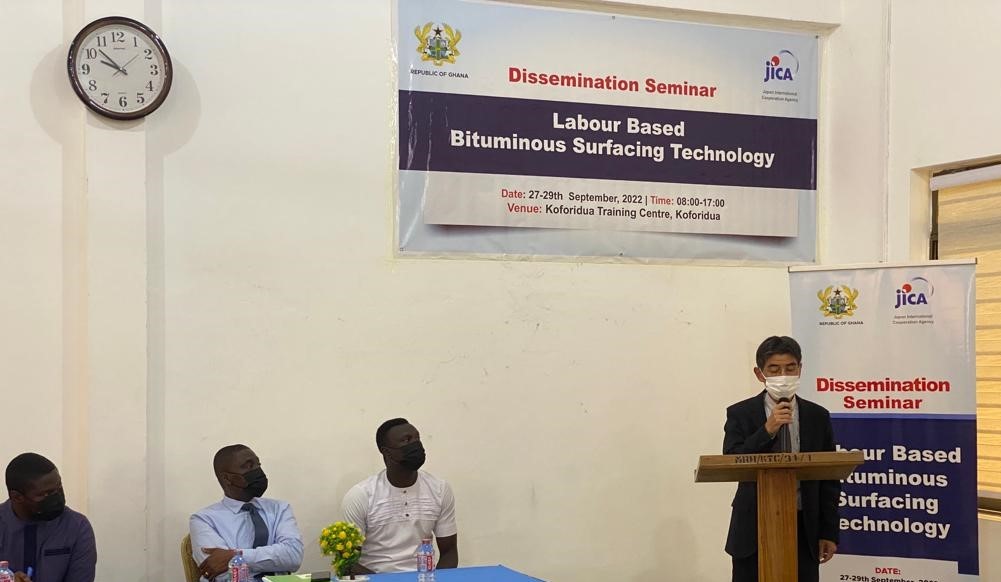
The Japan International Cooperation Agency, JICA, has organized a 3-day dissemination seminar on Labour-Based Bituminous Surfacing Technology (LBST) for Ghanaian engineers and stakeholders in the road construction sector.
This is the third time JICA has organized the seminar in collaboration with key stakeholders such as the Ministry of Local Government, Decentralization and Rural Development, Department of Feeder Roads, Ministry of Roads and Highways (MRH) and the Ghana Production Safety Net Project. The training took place in Koforidua.
The Chief Representative of JICA Ghana, Mr. Yasumichi Araki, in his speech, said: “The Government of Ghana (through the Department of Feeder Roads) and JICA implemented a Technical Cooperation project on LBST from February 2016 to December 2018. Two field trials were conducted during the project to come up with “Guidelines for labour-based bituminous surfacing technology”, which was launched by MRH in December 2018.
The performance of the trial construction show that LBST could be applied to undertake road-sealing work for low-volume roads, and contribute to generating employment opportunities among local people, especially in rural area.
The LBST project, aside ensuring quality road infrastructure and knowledge transfer, is capable of creating opportunities for small local contractors to provide construction services. The Project is also a good catalyst to improving the livelihood of people in rural communities, in line with the existing Labour-Intensive Public Works (LIPW) program under the Ghana Productive Safety Net Project funded by the World Bank.
In a speech read on behalf of the Director for Policy Planning, Budget-Monitoring and Evaluation (PPBME) of the Ministry of Local Government, Decentralization and Rural Development, Mr. Eli Kwadey (Head of Monitoring and Evaluation), reiterated that: “The Ministry is grateful to JICA for the LSBT Project and the seminars organized to disseminate the methodology. The Project ties in with the Ghana Productive Safety Net Project, particularly, the Labour-Intensive Public Works (LIPW) component, which delivers rural assets such as small earth dams and feeder roads and provides jobs to the rural poor. The Ministry is highly interested in adopting and supporting interventions and technologies that will facilitate value for money, address sustainability in financing and deliver quality assets with jobs creation.”
He affirmed that: “The Ministry supports LBST and we are looking at deepening our engagement to provide capacity-building for all Works and Roads Engineers in our Districts to adopt the LBST approach when implementing feeder road projects through the Common Fund. This approach, together with technical assistance from JICA would go a long way to increase the longevity of our feeder roads and facilitate local economic growth, particularly in the rural areas.”
The Deputy Director for the Department of Feeder Roads, Engr. Peter YAwson, added that: “This seminar is part of the process of ensuring that engineers within the MMDAs will benefit from this knowledge-transfer and be able to influence the uptake of the method and adopt them for their projects. I can assure you all that the Department is committed and will ensure that the necessary resources are used to do more LBST across the country.”

JICA has been prioritizing infrastructure development especially roads, for more than 40 years in Ghana. JICA has supported the construction of over 700 kilometers of roads over the years.
Currently, the rehabilitation of 32 kilometers of National Trunk Road 8 (Phase 2) is ongoing while construction of Tema Interchange (Phase 2) has commenced. Both projects are implemented under JICA’s Grant Aid Scheme.

